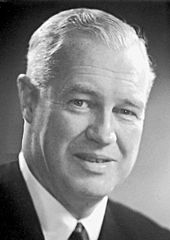Alexander Robertus Todd
Alexander Robertus Todd, Baron Todd (born October 2, 1907 in Glasgow , † January 10, 1997 in Cambridge ) was a British chemist . In 1957 he received the Nobel Prize for Chemistry for “fundamental work on the group of nucleotides and nucleotide coenzymes , whose construction principle and chemical function he has elucidated”.
Life
Alexander Todd was born in Glasgow, Scotland , in 1907 and stayed there until he graduated from the University of Glasgow . His doctorate took place in Germany at the Johann Wolfgang Goethe University in Frankfurt am Main , a second in 1933 in Oxford . In 1936 he became a lecturer at the Lister Institute for Preventive Medicine in London , where he taught biochemistry . From 1937 he taught the same subject at the University of London. A year later he was appointed Professor of Organic Chemistry and Head of Chemical Laboratories at the University of Manchester . In 1944 he was appointed full professor of organic chemistry at Cambridge University , where he stayed until 1971 and then retired. He died in Cambridge in 1997 at the age of 89.
Act
Alexander Todd was one of the pioneers in the study of nucleic acids . He dealt primarily with the elucidation of the structure and the synthesis of nucleotides and described, among other things, in 1949 together with James Baddiley the first chemical synthesis of adenosine triphosphate (ATP). His first important structural clarifications in this area date back to 1942, where he succeeded in deciphering details about the structure and the reaction mechanisms. At the beginning of the 1950s, he was able to artificially produce some of the nucleotides that make up deoxyribonucleic acid (DNA), which is the carrier of genetic information in all organisms.
In 1955 he clarified the structure of vitamin B12 by combining methods of organic chemistry with X-ray structure analysis for the first time . He also dealt with the structure of the nucleotide coenzymes, which act as enzymes in DNA. His most important work was the elucidation of the structure of deoxyribonucleic acid and ribonucleic acid (RNA), with which he laid the foundations for modern genetics , biochemistry and molecular biology .
He was a co-discoverer of the Atherton-Todd reaction .
honors and awards
In addition to the Nobel Prize, Alexander Todd was honored in many ways for his scientific work. In 1954, he was promoted to a Knight Bachelor's degree by Queen Elisabeth II and in 1962 as Baron Todd , of Trumpington in the County of Cambridge, was promoted to Life Peer . Since 1966 he was also a member of the Pour le Mérite order for science and the arts .
The scientific honors include the following:
- Honorary doctorates from the universities of Kiel , Glasgow , London , Madrid , Exeter , Leicester , Aligarh , Wales , Yale , Sheffield and Melbourne .
- Membership in the Royal Society
- Membership of the National Academy of Sciences (1955), the American Academy of Arts and Sciences (1957), the American Philosophical Society (1965), the Royal Society of Edinburgh (1966), the Austrian Academy of Sciences and the Spanish Council of Scientific Investigation and other international scientific associations
- 1955 Royal Medal of the Royal Society
- 1957 member of the German Academy of Sciences Leopoldina
- 1962 Paul Karrer lecture .
- 1966 Robert Robinson Award
- Meldola Medal from the Royal Institute of Chemistry and the Society of Maccabeans
- Davy Medal and Royal Medal of the Royal Society
- Cannizaro Medal from the Italian Chemical Society
- French Chemical Society Lavoisier Medal
- Lomonosov Gold Medal of the Russian Academy of Sciences
Web links
- Information from the Nobel Foundation on the 1957 award ceremony for Alexander R. Todd (English)
- Literature by and about Alexander Robertus Todd in the catalog of the German National Library
Individual evidence
- ^ Member History: Lord Todd. American Philosophical Society, accessed November 13, 2018 .
- ^ Fellows Directory. Biographical Index: Former RSE Fellows 1783–2002. (PDF file) Royal Society of Edinburgh, accessed April 16, 2020 .
- ↑ Member entry of Lord Alexander R. Todd (with picture) at the German Academy of Natural Scientists Leopoldina , accessed on June 18, 2016.
| personal data | |
|---|---|
| SURNAME | Todd, Alexander Robertus |
| ALTERNATIVE NAMES | Alexander Robertus Todd, Baron Todd (full name); Sir Alexander Todd |
| BRIEF DESCRIPTION | British chemist, Nobel Prize in Chemistry |
| DATE OF BIRTH | October 2, 1907 |
| PLACE OF BIRTH | Glasgow |
| DATE OF DEATH | January 10, 1997 |
| Place of death | Cambridge |
